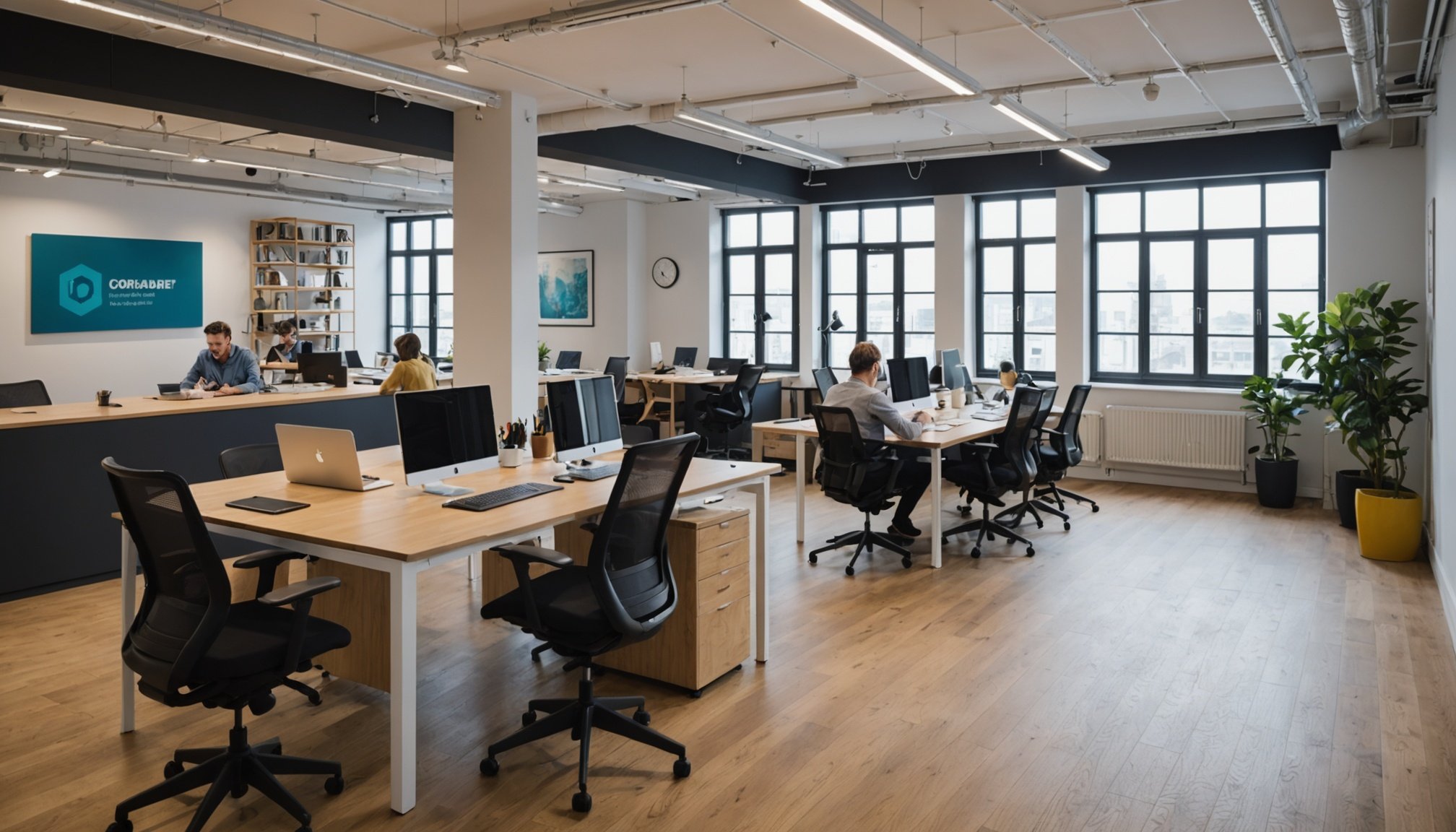Importance of Choosing the Right Co-Working Space
Selecting the right co-working environment is crucial for startups, especially within the UK tech industry. The dynamic and collaborative nature of co-working spaces can significantly impact a startup’s success. These environments foster innovation by bringing together diverse professionals who exchange ideas and collaborate on projects. For tech startups, being in a space that encourages creativity and teamwork can be a game-changer.
Understanding the unique needs of tech startups is essential when choosing a workspace. Startups often require a flexible environment that can adapt to rapid changes and growth. A co-working space that allows easy scalability and offers flexible arrangements can provide the necessary support as the startup evolves.
Also to discover : Transforming Customer Interaction: Innovative AI Strategies for UK Businesses
The role of co-working spaces extends beyond mere provision of desks and Wi-Fi. They are designed to facilitate networking, providing access to a community of like-minded individuals and potential mentors. This connectivity can be invaluable for early-stage startups looking to establish themselves in the competitive tech industry of the UK.
In conclusion, choosing the right co-working environment is more than just an operational decision; it is a strategic move that can propel a tech startup towards greater innovation and collaboration.
In the same genre : Innovative Strategies for UK Universities to Skyrocket Domestic Student Enrollment
Key Considerations for Location
When selecting a co-working environment for startups in the UK tech industry, choosing the right location is crucial. A strategically located workspace can enhance a startup’s growth potential by offering proximity to talent pools and easy access to clients. Being near educational institutions or tech hubs can provide a continuous influx of fresh ideas and skilled professionals, crucial for innovation.
Accessibility is another vital aspect. Good transportation links ensure teams can commute with ease and efficiency. Co-working spaces situated near major transport networks reduce the daily hassle of commuting, keeping productivity levels high. Whether it’s via public transport or optimal road networks, seamless accessibility plays a significant role.
The availability of other tech-focused businesses nearby can create an ecosystem ripe for collaboration and sharing resources. This enhances networking prospects, paving the way for partnerships and new opportunities. Close proximity to such businesses fosters a community where ideas and solutions can be exchanged readily.
Ultimately, an ideal co-working location balances these factors to support a startup’s growth, fostering an environment where innovation can thrive and collaboration extends beyond just the workspace.
Assessing Amenities and Facilities
When evaluating a co-working space, amenities and facilities play a crucial role, especially for tech startups. These companies often require high-speed internet and dependable tech support as baseline necessities. Without reliable connectivity, productivity can be significantly hindered, impacting the startup’s operations. Facilities should include ample meeting rooms or event spaces to conduct pitches, demos, or group brainstorming sessions effectively.
Further, communal areas like lounges or kitchens offer informal networking and relaxation opportunities, fostering a sense of community among co-workers. These spaces often become the heart of interactions, sparking spontaneous exchanges of ideas between diverse professionals.
Tech-focused startups benefit much from comprehensive workspace setups that include ergonomic desks and chairs, as well as dedicated innovation corners. Such facilities help in nurturing creativity and can directly reflect on the team’s morale and output.
It is important for startups to recognize these offerings as more than optional extras. They are integral components of an optimized working environment that supports growth and innovation. Assessing these elements thoroughly ensures the space aligns with the unique requirements of the startup while enhancing operational efficiency.
Cost Considerations
Grasping the cost dynamics of co-working environments is paramount for startups navigating financial constraints within the UK tech industry. Typical pricing models can range from hot desks charged per day to private offices available on a monthly basis. Understanding these options helps startups pinpoint what aligns best with their operational cadence and financial planning. Evaluating the cost-effectiveness of a space should involve analysing how amenities, location, and other benefits stack up against the price.
A savvy budgeting approach involves weighing the essentials against the perks to ensure maximum value. Startups must remain vigilant about hidden costs, such as additional fees for conference room bookings or exclusive events, which can inflate the overall expenditure. Negotiating contracts can offer leeway, providing startups leverage to adjust terms to better suit their growth trajectory.
Consider future needs when comparing costs. Some spaces offer scalable options, allowing startups to expand within the same co-working ecosystem without incurring exorbitant relocation expenses. Exploring these flexible options can mitigate unforeseen costs down the line, ensuring that the financial investment into a co-working space remains manageable as the business scales. This proactive assessment ensures that startups make informed decisions that support both current operations and future ambitions.
Community Culture and Networking Opportunities
The community culture within a co-working environment plays an integral role in shaping a startup’s work experience and potential for success. An engaging community fosters a sense of connection and support among startups, which can be instrumental in a tech startup’s growth. The presence of a vibrant community can lead to new collaborations and the sharing of ideas, providing startups with invaluable perspectives and resources.
Co-working spaces often facilitate collaboration and mentorship through structured initiatives such as networking events and workshops. These activities offer opportunities for startups to connect with seasoned entrepreneurs and industry experts, aligning with the collaborative spirit fostered by these environments. Such interactions can lead to mentorship relationships that guide startups through the challenges of the tech industry.
Moreover, regular events and workshops within co-working spaces encourage networking among startup teams, sparking potential collaborations. These events can range from informal meetups to formal seminars led by industry leaders. Participating in these curated activities allows startups to broaden their networks and explore partnership opportunities, further expanding their influence within the UK tech industry. Engaging in a co-working community not only enhances a startup’s social and professional network but also plays a pivotal role in accelerating its innovative journey.
Scalability and Flexibility Options
For startups, the scalability and flexibility of a co-working space significantly influence their operational dynamics. Flexible leasing terms are often a top priority. They allow startups to adapt quickly to the evolving demands of the business, accommodating either rapid growth or unexpected adjustments. This adaptability is crucial for startups that consistently navigate uncertain markets and fluctuate in size.
Assessing the potential for expansion within the same co-working environment ensures long-term alignment with a startup’s growth trajectory. Many co-working spaces provide scalable options, enabling businesses to transition seamlessly from shared desks to private offices as their teams expand. This not only saves on relocation costs but also maintains continuity in business operations and networking circles.
Furthermore, co-working spaces typically offer various services and support tailored to fostering growth. These can include business development resources, administrative support, and access to technology consultancy. By choosing a space that offers such enhancements, startups set a strong foundation for sustainable development.
Evaluating these aspects ensures that startups select co-working spaces which not only meet their current needs but also provide room to thrive as opportunities and challenges arise. This strategic choice plays a pivotal role in nurturing a business’s success.
Case Studies of Successful Startups in Co-Working Spaces
Examining real-world case studies provides insight into how co-working environments can drive success for tech startups. Tech startups like Slack and Instagram began their journeys in co-working spaces, harnessing the collaborative atmosphere to foster their early growth stages. By being in such environments, these companies had access to dynamic networks, which were crucial in securing early mentorship and funding opportunities.
A notable case is TransferWise (now Wise), a company that thrived at TechHub in London. The vibrant community and access to potential partners accelerated their development. The workspace offered TransferWise the flexibility to scale efficiently as their team grew, thus accommodating their evolving needs seamlessly.
Paragraph 2 With UK-specific case studies, startups like Monzo highlight the benefit of location. Based in Old Street, often dubbed ‘Silicon Roundabout,’ Monzo capitalised on proximity to tech talent and investors. Their story illustrates how strategic location within a tech hub fosters easy access to resources necessary for rapid progression.
Lessons from these startups emphasise the importance of choosing a space that aligns with your company’s unique requirements and growth potential. Selecting the right co-working environment offers startups essential collaborations and technologies that nurture innovation, and support long-term success.
Final Thoughts on Choosing the Right Co-Working Space
Deciding on the ideal co-working environment involves weighing many important factors. Key elements such as location, amenities, community culture, and cost all play a significant role in influencing a startup’s trajectory. With the potential to impact productivity, innovation, and growth, selecting the right space is crucial. Data suggests that offices with modern amenities and access to vibrant tech communities significantly boost startups’ operational efficiency and networking opportunities.
When considering options, it’s wise to compare spaces based on scalability and services. Flexible spaces that accommodate growth and offer supportive resources, such as business development services, enrich a startup’s potential for success. Visiting multiple locations allows founders to evaluate the environment and match it to their team’s dynamic.
Before finalising any decision, startups should seek feedback from current occupants to understand how their needs have been met. Recommendations from fellow entrepreneurs provide a clearer picture of what to expect. Don’t rush the decision; carefully choosing a space that aligns with future ambitions and current operations can provide the foundation for sustained success in the ever-evolving UK tech industry.











